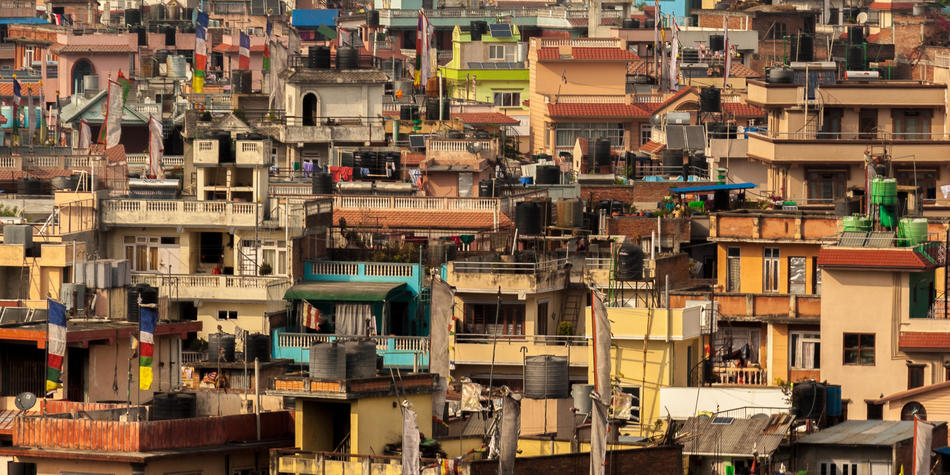Supporting communities affected by disasters, conflict, famine or an epidemic is what the humanitarian system does best.
Whether it’s an earthquake in a low-income nation, a border conflict in remote terrain or a bushfire or flood here in Australia, humanitarian assistance helps communities get back on their feet and fosters a sense of resilience and long-term independence.
Because humanitarian assistance is such a broad field, people with a wide variety of skills and professional backgrounds can make a significant and empowering difference. ‘If you have a passion and interest in trying to help other people, it's hard to think of anyone who this career isn’t relevant for,’ says Daniel McAvoy, a lecturer in humanitarian assistance at Deakin.
Deciding to make a difference
Indeed, Deakin’s Graduate Certificate of Humanitarian Assistance draws students from a wide variety of disciplines and levels of experience.
There are people keen to expand on their experience working for non-government organisations with an international focus like the Red Cross, Oxfam and World Vision, as well as local agencies.
‘There's quite a lot of cross-over between international humanitarian work and helping refugees and asylum seekers settle in Australia, and helping people who are from vulnerable settings when we experience disasters, which seems to be a fairly frequent event at the moment,’ McAvoy says.
Because the humanitarian response is charged with providing shelter, access to safe water and sanitation, food and medical aid, McAvoy says the course is also popular with people with transferrable skills making the switch from other fields of study and work.
‘This career path is ideal if you've got skills in areas like nursing, medicine, engineering and IT but would like to work overseas or within Australia helping to provide support to organisations in humanitarian disasters or similar sorts of situations.
‘There's also quite a lot of generalist skills that are really valuable in the humanitarian sector, like IT skills, financial management and proposal writing and logistics skills, in terms of getting things from point A to point B and storing things appropriately so they don't get spoiled.’
Studying humanitarian assistance at Deakin
Through examination and critique of the core principles of humanity, impartiality, neutrality and independence, students at Deakin hone a comprehensive understanding of what humanitarianism means and an appreciation of its history.
‘We take a critical stance throughout the course that explores how humanitarian ideas and ideals have a long history and are a universal part of almost every culture,’ McAvoy says.
‘We also want students to leave with the ability to critically reflect on their own power and privilege and to work in a way that builds resilience and independence rather than perpetuating systems that reinforce inequality.’
Crucially, humanitarian assistance is more than charitable donations and food aid, and McAvoy says students learn how to navigate the intersection of humanitarianism and development.
‘We want students who leave our course to have practical skills, but we also want them to have a critical understanding of humanitarian work – this is something we embed in our teaching,’ he says.
‘It's actually quite complicated to help people in a way that's professional, without undermining long-term independence, in ways that are culturally safe and also apply technical standards. It’s about more than good intentions.’
Students can also choose from a broad range of elective subjects to follow their interests. ‘Someone with a strong interest in climate change, for example, might do the humanitarian disaster risk reduction unit and perhaps a unit in community development to help them work with communities that are exposed to disasters,’ McAvoy says.
Inspiring humanitarian aid careers
The incidence and severity of disasters is increasing globally. More people than ever before are being impacted by the consequences of conflict and climate change – and COVID-19. Demand for skilled professionals who can work effectively with communities to prepare for and recover from disasters is increasing, and the sector is transforming rapidly.
Employment opportunities in humanitarian assistance are on the rise in areas like capacity building, impact evaluation, project management and community development. McAvoy says Deakin’s graduates work in a wide variety of government and non-government organisations in Australia and internationally in roles directly linked to practical skills and knowledge gained from the course.
‘A nurse or medical doctor might do the Graduate Certificate of Humanitarian Assistance and then apply to Médecins Sans Frontières,’ he says. ‘Together with their nursing qualification, it’s a really nice bridge to work for a medical organisation that works in humanitarian sectors.
‘An engineer might do the course and work in refugee crisis helping to provide safe water and sanitation for people. A paramedic might work for a bushfire recovery organisation, and we have several graduates working in emergency management roles in local government.’
Alternatively, students may go on to study the Master of Humanitarianism and Development. ‘The extra year allows time to do an internship and a research project, as well as consolidate skills and knowledge through taking additional electives,’ McAvoy says.
Ready to become a humanitarian leader? Discover humanitarian assistance at Deakin

